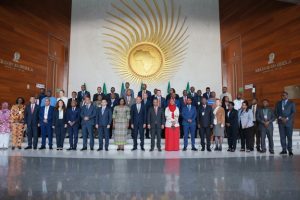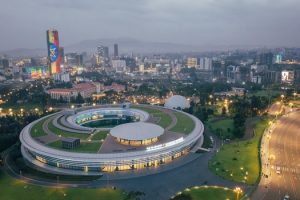BY ABEBE WOLDEGIORGIS
It is crystal clear that agriculture is the mainstay of Ethiopia’s economy that has been run in traditional ways with no or less technological utilization, which in turn results in minimal outcome. The sector is also highly vulnerable to drought, herbs and pests which potentially diminish its productivity. The government has so far taken a number of measures with a view to improving the production and productivity of the sector. The role played by the Ethiopian Agricultural Research Institute along this line would come at the forefront.
Of the various steps taken by the institute, doing a range of researches to breed improved seeds through utilizing biotechnology and disseminating the viable findings to farmers and other stakeholders haves been bearing fruits. Such a remarkable move has helped the nation record better results with regard to properly utilizing what the country does have.
For instance, plant tissue culture techniques have been employed in Ethiopia for decades since the government established national biotechnology research roadmap in 2019. These plant tissue culture techniques have become widely used throughout the country at federal and regional agricultural research institutes levels, some national universities, and private enterprises too. Areka Agricultural Research Center is one of the branches of Ethiopia’s Southern Agricultural Research Institute, and it is tasked with conducting plant biotechnology research, including plant tissue culture.
In this regard, the tissue culture research laboratory was established with the goal of conducting comprehensive research on the in vitro of selected horticultural crops, conservation and generating disease free planting materials from infested mother plants. As a result, it has contributed a lot to the provision of baseline data for future study advancement.
Obsi Desalegn is an agricultural researcher working in the National Agricultural Biotechnology Research Center under the auspicious of Ethiopian Agricultural Research Institute. As to him, the major purpose of utilizing tissue culture is generating crop plants which have problems of reproducing through preparing reproducing protocol by in- vitro mechanism in the laboratory. In addition, improving the breed has been carried out using DH technology.
It mainly serves to generate improved plant species by bringing them from local areas or from abroad. Furthermore, it helps protecting and preserving endangered plant species out of their natural places through in-vitro conservation, and it has broad applications. It also serves to delay the plants natural growth and to keep them alive for many years.
Reproducing plants through tissue culture needs various media components and some of the components are obtained locally while others are imported from abroad incurring hard currency. Molecular aspect gen screening technology will be carried out hand in hand with these steps. Since the nation has abundant biodiversity resources apart from reproducing, it is possible to screen plant species which can resist abiotic stress through utilizing tissue culture.
The practice does not necessarily reduce time for reproduction instead it can increase the plants in manifold as it helps reproduce more than a million from one seedling. It is possible to reproduce millions of coffee or banana seedlings using limited space. To that end, building green house and laboratories is the initial investment.
Asked about how far efforts are under way to reach farmers through tissue culture based reproduced plants, Obsi said that currently the institute is working on projects mainly focusing on advertising and promoting the tissue culture products. It has prepared protocol for reproducing hybrids coffee which is not reproduced in the conventional way. The project is tailored to promote reproduced coffee in the places where there is conducive agro-ecology for bumper coffee. But the country doesn’t have such a lucrative experience.
Besides, it is planned to provide the farming community with reproduced Pineapples and banana seedlings, which is the plan of the government to support the sector. In order to substitute the imported seedlings by local ones, capacity building is underway. Research institutions have also been engaged in preparing tissue culture protocol. It is also intended to supply the products to the commercial laboratories.
For instance, there is the local company known as TBS and it has the capacity to reproduce millions of banana seedlings. The Adamitulu Agricultural Research Institute will also have the capacity to reproduce seedlings to provide farmers or commercial farms with the product.
Currently, activities have been carried out on banana, pineapple, ginger and coffee. Reproducing temperate fruits has also continued. The task is being undertaken in Holeta Agricultural Institute. Reproducing potato in the laboratory is also conducted and there is also a program which focuses on producing and supplying farmers’ with mete-value small particles of tissues.
There are projects supported by the government at present aiming at preparing protocols helpful to reproduce plants easily. The Protocols are prepared by the public money and do not need ownership right. Particularly protocols utilized for reproducing coffee and banana are prepared by the Ethiopian Agricultural Research Institute, and no one claims ownership right, and supplying the products to farmers is the mandate left to EARI.
As mentioned above, the main objective of the public research centers is to reproduce plant seedlings and promoting and introducing them. Private companies also have their own role in this regard. After the signing of memorandum of understanding with the public research institute, it is possible to reach farmers in Afar region through banana seedling. The seedlings were also sent to Amhara region.
Advertising of reproduced coffee in places such as Ajere, Yayu gulele and Woliso in Oromia region took place two years ago and exercising the scaling up of such a rewarding practice will continue. The projects engaging in enhancing tissue culture have a potential to create job opportunities to thousands. They youth, by organizing themselves, can engage in farming through utilizing tissue culture products.
As to Obsi, good jobs have been done in Ethiopia regarding tissue culture, but tasks have not reached to the expected higher level because it needs more inputs as some of them are imported from abroad. Particularly the bio sectors are very expensive and hard to start research. Therefore, paying attention to the sector both by government and other stakeholders is vital.
Tissue culture practice is a source of earning hard currency in other countries; even the private sector is engaged in such ventures and is capable of earning a lot. In the past, Ethiopia has imported banana seedlings reproduced by the tissue culture from India, but now the seedlings are substituted by locally produced one.
Brazil has reproduced coffee by tissue culture and it has managed to transform its coffee production in particular and nation’s economy at large. In this country, not only has the government engaged in reproducing coffee by tissue culture but also the private sector is engaged in the scheme in this country. Therefore, broadening the space to the private sector to play its part in tissue culture here in our country is quite essential and rewarding in the long run.
The Ethiopian Herald April 14/2023




